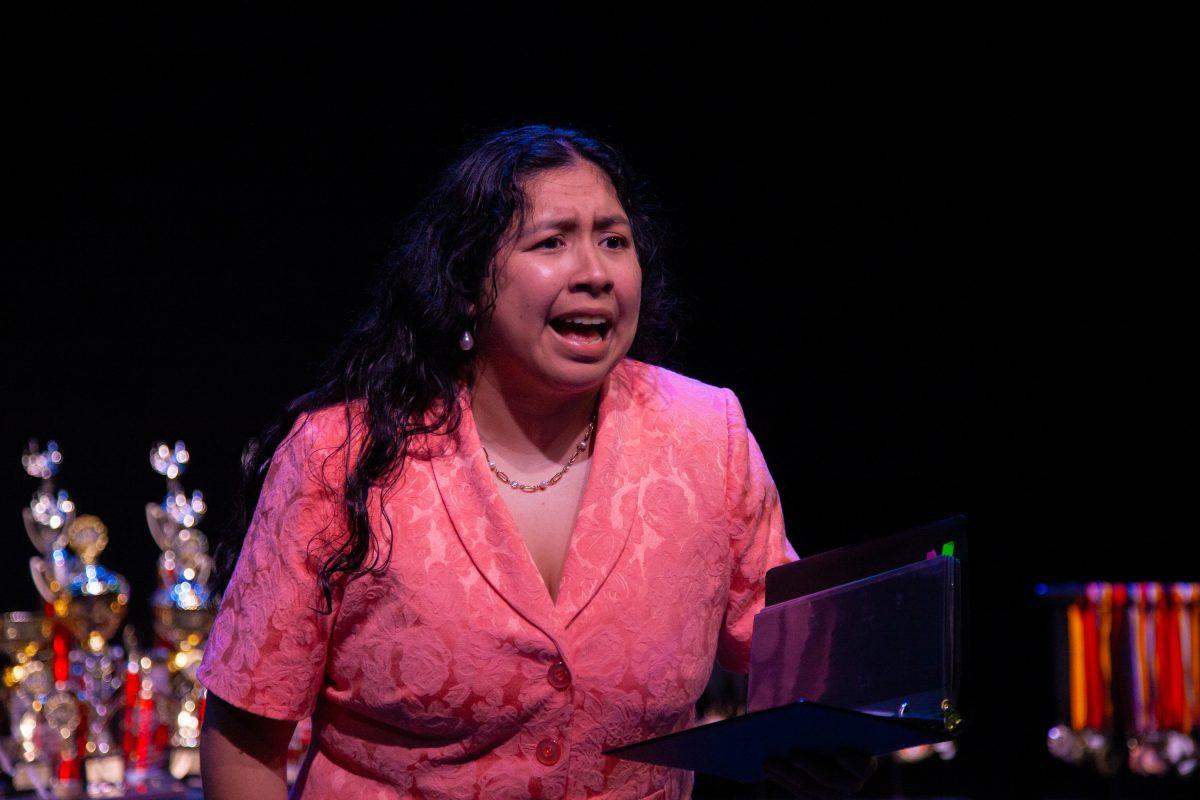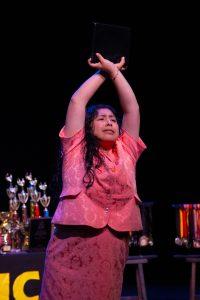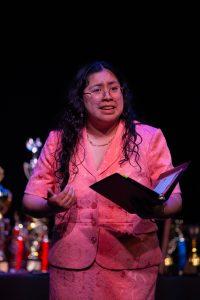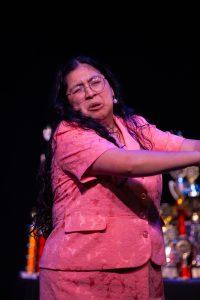 Victoria Olivares performs at the public performance held every spring by Phi Rho Pi. This is the final performance for graduating students and will be her final time.
Victoria Olivares performs at the public performance held every spring by Phi Rho Pi. This is the final performance for graduating students and will be her final time.
I am a woman.
My mom always said I argue too much. Because of how hard headed I was, she always told me to go into law. I took her advice for once and started making that my goal. So the next week as I was signing up for classes I signed up for speech and debate. I had no idea this would be the start of a new chapter of my life and how much it would change me.
 Events include a dramatic performance of program oral interpretation, also known as POI. This program focuses on a weaved collection of narratives to create one major message.
Events include a dramatic performance of program oral interpretation, also known as POI. This program focuses on a weaved collection of narratives to create one major message.
I have always been a woman.
Speech and debate became my life. My family had meager means growing up, so I always had a hard time finding professional attire on budget. However, even with this, I thought my skill would be what people would focus on as I spoke. I finally had a space where people would stop and give their undivided attention to me for just a moment. I had finally felt heard as I told my story or fought for what I thought was right in each round I competed in.
But I was just a woman.
I was always looked at differently growing up because I had darker features and my complexion was different than others. I felt like I didn’t have a safe space growing up because of this, as my peers had fair skin and light eyes. I was called everything in the book from Dora to slurs at my face, telling me to go back to where I came from. I used speech and debate as my outlet to advocate for myself. I found beauty in my heritage and culture and being able to demand a change in the circuit for people like me. But with everything I tried to fight for, it still felt like they treated and looked at me differently.
They saw me as a woman.
Over time, I realized being a woman in debate isn’t so straightforward. You were either too pretty and you are only winning rounds because of the way you look. Or you look ugly and everything you wear just looks wrong to the point that the ballots you receive are not about your piece or arguments but about your body. I was told to wear different clothes, that my blouse was too tight, that what I wore distracted from what I was saying. I was a child. These were the ballots that were supposed to help you grow into a better speaker. The ballots that were supposed to encourage you in the speech world. But you can’t say anything to try and contest it — the judge is always right.
I didn’t choose to be a woman.
As I grew older, the toxicity in the circuit also grew. I went up in skill, knowing close to nothing to being able to compete in University Interscholastic League state every single year for speech and debate. Reaching my junior year, there was always one word that haunted me, “catty.” Any time I debated or just presented, I was always called “catty” and “prideful” even though I was just stating my case. I realized when I was partnered with a male counterpart, even though he was more aggressive than me, he never got the same comments. Even if my partner was downright rude or disrespectful, I was always targeted in those ballots saying I was the problem.
 Olivares did competitive speech and debate for a total of six years, including four in high school and two in college with a total of 11 different events during her seasons.
Olivares did competitive speech and debate for a total of six years, including four in high school and two in college with a total of 11 different events during her seasons.
Because of something out of my control I will always debate like a woman.
Still competing now, I never realized just how much their words had actually affected me. I had a short fuse when anybody talked about what I wore even outside the debate space. I grew self conscious of what my body looked like to people and fell into a dark spiral with my mental health. Even though years had passed since the beginning, I still feel like that same girl just trying to tell her story to a crowd of people who see nothing but feminine features and look down on her because of it. I speak, I protest for my family and for the harsh changes going on in the world. I want to be known for my voice and for the stories I am able to tell, changing the world little by little. I don’t know if I can sometimes.
Because I am a woman.
It was hard creating a space for myself in an area that was supposed to specialize in acceptance. For years I struggled in my identity and balancing all of my raw emotions with professionalism in the competitive space of speech and debate. In high school, there was either nothing but overacting or a fear of being too emotional to where you get docked because of it. Because of the way I looked, I had to be extra careful in this space.
For I have always been a woman.
I competed in University Interscholastic League, National Speech and Debate Association circuit and now on the collegiate level. I remember sitting in the chairs of NSDA and being able to watch the final debates surrounded by other women. Almost every single time, the debaters on that stage were men. I had always told myself that I would be able to reach that level of skill and that one day I would be good enough to be able to go on that stage just like they did. NSDA put out a report through 2021 saying that almost 53% of its members are female. Yet, it shows that all-girl teams are 17% less likely to win when competing against all-boy teams.
I am just a woman.
I knew, for years, that I always had to try just a bit harder in every aspect of my entire life. I am first-generation. I am a Latina. I am a woman. These aspects of my life that I had no way of controlling always seemed to have invited unwanted opinions. I worked hard to find joy in these things, in those 7 or 10 minutes each performance where people saw me as more than just those physical features. For that time, I was more than just what they saw me as.
 Photo courtesy of Jessica Cooke. All photography was pre-performance testing, warm-ups and the performance itself.
Photo courtesy of Jessica Cooke. All photography was pre-performance testing, warm-ups and the performance itself.
So see me as a woman.
Times have changed since I first started speech and debate roughly six years ago. There is so much more training and advocacy for us as competitors to be judged fairly and not just looked at for our physical characteristics. Even though there are moments that remind me of what happened before as I was told in a ballot this competitive season, “the dress you are wearing is nice, but distracting from the seriousness of the topic.” But I never let any of it stop me. I have made it to state over five times in high school and had multiple national qualifications. In college, I now have one bronze, three silvers and one gold in the Phi Rho Pi circuit. By the end of this summer, I will have a total of five degrees, and I am now applying to law school. I know everything is getting better, and that there is a genuine space for women like me in this world. Things need to continue to change to allow for competitors like me to be more than just an identity in the system.
I will always debate like a woman.
And I am proud of it.